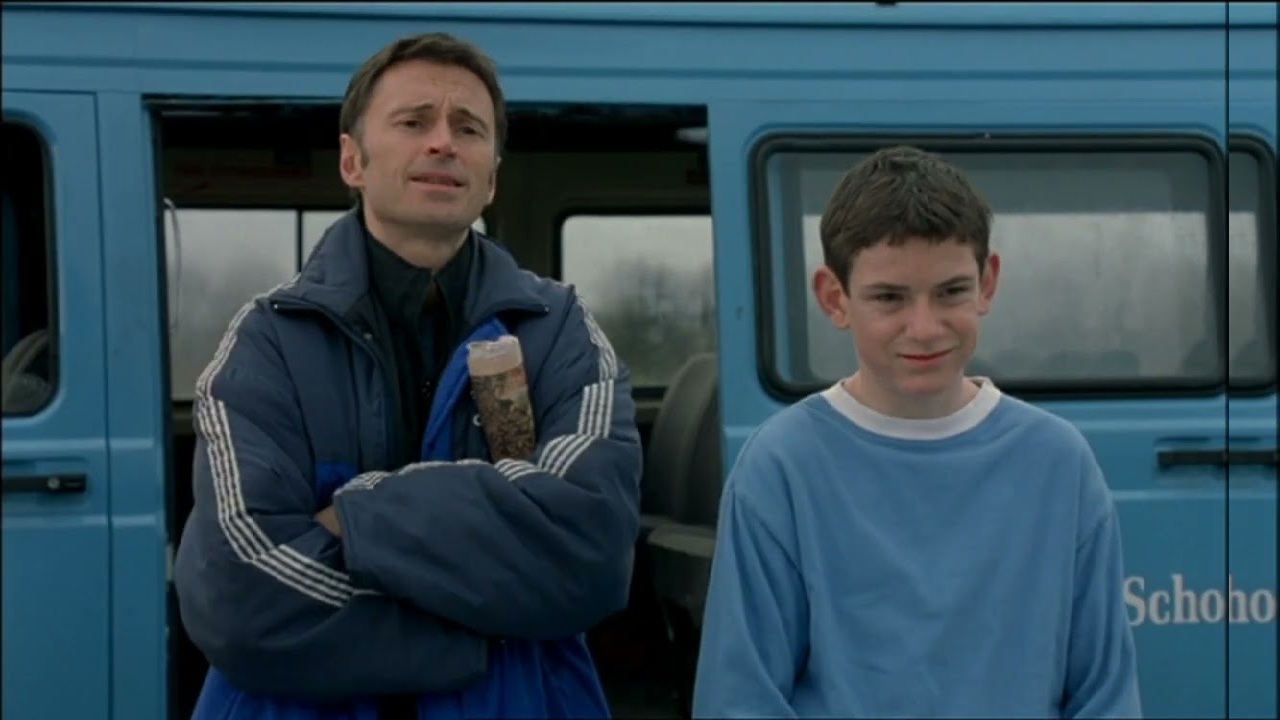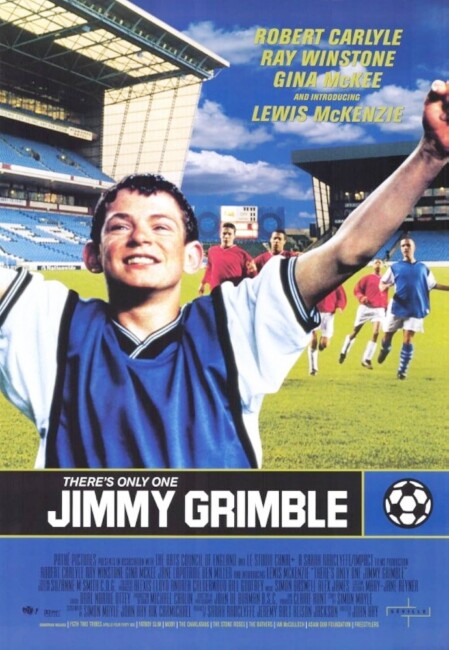Crew
Director – John Hay, Screenplay – Rik Carmichael, John Hay & Simon Mayle, Story – Simon Mayle, Producers – Jeremy Bolt, Alison Jackson & Sarah Radclyffe, Photography – John de Borman, Music – Simon Boswell & Alex James, Music Supervisors – Abi Leland & Dan Rose, Digital Effects – Cinesite Europe Ltd (Supervisor – Catherine Duncan), Production Design – Michael Carlin. Production Company – Pathé Pictures/The Arts Council of England/Le Studio Canal +/Sarah Radclyffe/Impact Films.
Cast
Lewis McKenzie (Jimmy Grimble), Robert Carlyle (Eric Wirral), Gina McKee (Donna Grimble), Ben Miller (Johnny Two Dogs), Bobby Power (Gordon Burley), John Henshaw (Ken Burley), Ray Winstone (Harry Thomas), Samia Ghadie (Sara), Jane Lapotaire (Alice Brewer), John McArdle (Headmaster), Michael J. Jackson (Colin), Ciaran Griffiths (Psycho), Jim Whelan (Robbie Brewer)
Plot
Jimmy Grimble is a schoolboy at Manchester’s Greenock High School. Jimmy has a great love of football and eagerly signs up for the school team tryouts. Once accepted onto the team, Jimmy must contend with the bullying star player Gordon Burley, whose father has promised money to the school if the team can make it to the finals. At the same time, Jimmy’s mother finds a new boyfriend in the motorcycle-riding Johnny. Jimmy does not like Johnny, even as he proceeds to move in with his mother. Jimmy then meets a homeless old woman who gives him a pair of football boots that she claims are magic. Jimmy dismisses this and throws the boots away. After the bullying Gordon throws away Jimmy’s good boots, Jimmy is forced to return and find the other pair. Wearing the boots on the field, Jimmy is startled to find that they give him lightning feet and the unerring ability to score goals every time he kicks the ball.
British cinema used to be something that was always worth watching. Be it the classic Ealing comedies, to the heyday of Anglo-horror with studios like Hammer and Amicus. Even populist British television has a sanctified glow – be it classic genre shows like Doctor Who (1963-89), Blake’s 7 (1978-81) and Gerry Anderson to classics like The Avengers (1962-9), The Prisoner (1967-8), The Sweeney (1975-8), The Professionals (1977-83) and, even if one likes, Minder (1979-94). Not to mention the whole classic British comedy tradition.
Alas, since about the 1980s, British cinema and tv has gone into a decline. While there are many fine and excellent works being produced, populist and mainstream feature filmmaking (as opposed to works that are made more for the arts and culture audiences) has largely dried up. Most modern British cinema is made as serious drama – the sort that usually ends up on Academy Awards nominations list. Even tv has gone into a decline, mostly centring around soap operas like Coronation Street (1962– ), Eastenders (1985-2008) and various comedies, with the 1990s and beyond lacking anything memorable, excepting maybe the wonderful Cracker (1993-6). It is hard to say why there is such a decline in homemade populist entertainment in England. Maybe it is simply the difficulty in competing with Hollywood product on the global stage.
There’s Only One Jimmy Grimble is one example of the attempt to make a homemade film for populist British audiences. It is symptomatic of the problems faced by British cinema and of the reasons why it is failing to reach a wider audience. Jimmy Grimble takes a plot and story arc – kid gets a magically empowered sports item that aids them in becoming a star player – that is more familiar to American films than British ones. Indeed, the story of Jimmy Grimble has a remarkable number of similarities to an American film that came out not long after – Like Mike (2002), although there the kid found a magically empowered pair of basketball sneakers rather than soccer boots.

What is notable about There’s Only One Jimmy Grimble in comparison to various American films of its ilk, is that it rejects the cosy standardised American nuclear family environment and sets its sports fantasy around the harsh economic realities of Manchester. You are unlikely to ever see an American sports film that is set among dreary suburban high-rise tenements, broken homes, bullying boyfriends and unfaithful father figures.
That said, it is hard to see There’s Only One Jimmy Grimble as a film that is likely to play much beyond its intended Manchester audiences. The Mancunian accents are near indecipherable to anyone who is not British. More to the point, football or soccer is such a national religion, particularly among urban Midlands England, that trying to understand this kind of culture is an alienating experience to anybody else. I, for one, find it hard to place myself in the mindset where it is casually accepted that Robert Carlyle lives in a tiny apartment where trophies and other player’s jerseys are proudly placed in glass cases on walls.
In the very final shot of the film, young hero Lewis McKenzie asks in voiceover “What in life could be more important than football?” and then turns to the camera and says “Just kidding.” Unfortunately, Jimmy Grimble is made for an audience that might well consider the question seriously. Alas for the rest of the world, Jimmy Grimble did not appear to find much of an audience, least of all in the US where anyone who saw the film was no doubt be puzzled as to why football is being played without helmets, kneepads and cheerleaders on the sideline or for that matter with a round rather than an oval ball that players are not allowed to pick up and carry.
Nevertheless, There’s Only One Jimmy Grimble does eventually work in its tapping into the common story arc of the triumph of the underdog and rank outsider that plays through most sports films. There are all the familiar characters – the underdog who eventually wins out, the girl object of his affections, the bullying star player, the coach down on his luck. As is usually the case with these fantasy sports films, the magical item is lost at a crucial moment and the hero must go on on his own to arrive at the banal realisation that the true magic was inside himself all along.


